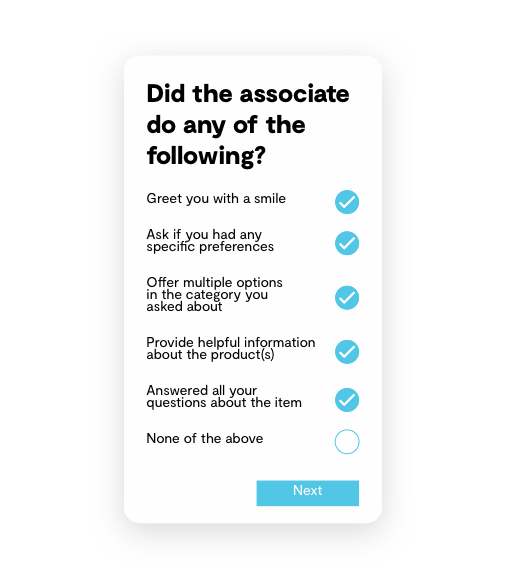Surveys help brands and retailers realize the customer experience through their shoppers’ eyes. This type of insights from mystery shopping survey questions is essential for those wanting to drive more profits and meet the demands of their customers.
The problem is many businesses don’t have the appropriate mystery shopping program set in place to collect customer data. Consider how mystery shopping is supposed to work.
Undercover agents fan out to test corporate assumptions, employee customer service coaching and training and current CX initiatives. Over time, reliable, high-value insights lead to concrete steps to improve store conditions and service.

Disruptive innovations follow.
Customers visit more and spend more, and the brand’s reputation and revenues grow. Reliable, high-value insights: this is where most programs break down.
Without enough of the right kind of data, retailers draw the wrong conclusions, overlook big problems, and make costly mistakes. Instead of creating a virtuous cycle of improvement, they spin their wheels and get nowhere.
To get the results you want out of your mystery shopping program, you need to know which questions to ask and the best way to ask them. You need the right people shopping your stores.
Here we’ll share 35 sample mystery shopping survey questions and explain the most brand-appropriate and cost-effective way to tackle these surveys:
Click on the jump links to skip ahead.
Designing an Actionable Mystery Shopping Survey: 3 Areas to Focus on In Store
Your mystery shopping survey questions should reflect the entire customer journey. This means you need to uncover even the smallest problems and opportunities to yield data, bucket and analyze over time to reveal subtler issues and growing trends.
Survey responses should be easily quantifiable, leaving little room for assumption. Yes/no or multiple choice questions are best. Open-ended questions can be used, but only to allow mystery shoppers to share observations in support of structured responses.
In-Store Cleanliness & Appearance Questions
None of these details will escape your customers’ notice. Any one of them could affect a customer’s decision to purchase and/or return to the store. Store managers should check these items during routine inspections.
However, mystery shoppers deployed to multiple locations over time help ensure all of your stores consistently meet brand standards.
- Was the parking lot generally clean?
- When you walked up to and through the store entrance, was it clean and well maintained?
- Did you notice any worn or damaged signs in the store?
- Did you notice any areas that needed attention?
- Was the restroom clean, well stocked, and working properly?
- Were the aisles clutter-free, with room for two or more carts to pass through?
Employee Behavior Questions
If employees aren’t meeting your brand standards in all locations and at all times, you haven’t achieved brand consistency—a key driver of customer loyalty. Recurring or widespread issues may suggest the need for training refreshers or updates.
- When you entered the store, did an associate acknowledge you within 30 seconds?
- Approximately how many other customers were in the store while you were shopping?
- When you were greeted, what was said?
- Did the associate/team member smile?
- Did the associate/team member ask what you were shopping for today?
- Did the associate/team member offer you help?
- Did the associate help you find the product by escorting you, or by giving you directions to find it on your own?
- Did the associate/team member recommend other products you might like?
- Did the associate/team member give you his/her undivided attention?
- Did the associate provide helpful information about the product?
- Was every associate you encountered upbeat and friendly?
- Were any associates/team members inconsiderate or rude?
- Did any associates/team members go above and beyond to serve you? If YES, what was his/her name and department, and how did he/she go above and beyond?
- Did all other associates/team members you encountered or passed smile and greet you?
- Did the associate/team member provide a pleasant closing comment (“Have a good day,” “Thanks for shopping with us,” “Thank you,” etc.)?
- Did the cashier greet/acknowledge you when you reached the counter?
- Did the cashier ask if you found everything you needed?
- Did the cashier mention the loyalty/rewards program by name during your transaction?
- If you’re not a member, did the cashier ask if you’d like to join?
- Did the cashier mention the invitation for the customer/guest satisfaction survey at the bottom of the receipt?
- Did the cashier thank you at the end of your transaction?
- If you had more than 2 bags, did someone offer to help carry them out?
Path to Purchase Questions
Are your products or procedures, or the pace of your operations, discouraging sales? Responses to questions like these will shed some light.
- Was every item you wanted to purchase available? If not, please list the unavailable item(s).
- Were you able to find the style and size you were looking for?
- Did all perishable foods (salads, sandwiches, etc.) appear fresh?
- How many registers were staffed when you got in line?
- Was there at least one (1) express lane open?
- Were there less than three (3) customers in line? If not, did anyone call for additional help (to manage the line or open another register)?
- Once you reached the counter, how long did it take to complete the transaction (get your receipt)?
The Most Important Question of All: Who Will Mystery Shop Your Stores?
Great customer experiences aren’t born in the C-suite. They’re built on feedback from customers—people who are genuinely invested in the brand.
The most unforgettable in-store experiences stay in lockstep with customer priorities and expectations, and they reaffirm and fulfill the brand promise. Traditional mystery shopping relies on input from dispassionate observers. But this approach has big downsides.
Not only is the traditional mystery shopping model cost-prohibitive and tough to scale, but professional mystery shoppers are easy to spot. These shoppers don’t have a stake in improving your brand.
That’s why no one is more qualified to mystery shop your stores than your own customers. They’re a perfect match for your ideal customer.
They observe and report on everything in the context of their own history with the brand. These shoppers also tell you what they see and how it impacts them (objective and subjective combined).
Not only do your shoppers love providing improvements to benefit them directly, but they will enjoy knowing their voice is heard by brands giving incentives and better in-store experiences.
Imagine getting a comprehensive, holistic view of the customer experience in one fell swoop. Scaling easily without draining your revenue.

Strengthen loyalty by empowering your own customers. It’s a practical solution to a longstanding problem and more brands are catching on.
Want to see a mystery shopping program that’s more affordable and more actionable than ever before? Learn about Journey IQ and contact our team today for demo!





